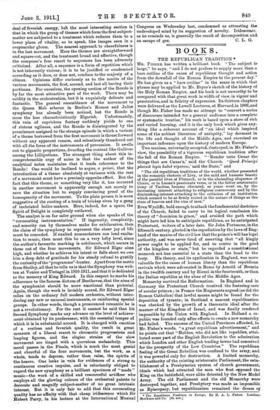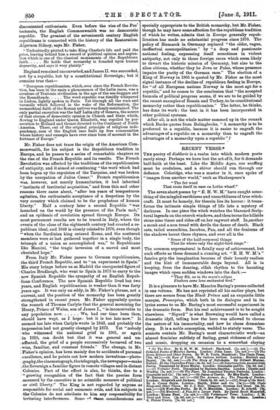BOOKS.
THE REPUBLICAN TRADITION *
Ma. FISHEa has written a brilliant book. "The subject is large," he says, "and I do not profess to supply more than a bare outline of the cause of republican thought and action from the downfall of the Roman Empire to the present day." He has given us a "bare outline" in the sense in which that phrase may be applied to Mr. Bryce's sketch of the history of the Holy Roman Empire, and his book is not unworthy to ba compared with that great work in width of view, in vigour and penetration, and in felicity of expression. Its thirteen chapters were delivered as the Lowell Lectures, at Harvard, in 1909, and though Mr. Fisher has made no attempt to "convert a series of discourses intended for a general audience into a complete or systematic treatise," his work is based upon a store of rich and varied learning, and it is the only book which gives any- thing like a coherent account of "an ideal which inspired some of the noblest literature of antiquity," lay dormant in the life and thought of the Middle Ages, and exercised an important influence upon the history of modern Europe.
Two maxims, universally accepted, destroyed, in Mr. Fisher'e view, the possibility of a vigorous republican tradition after the fall of the Roman Empire. " ' Render unto Cmsar the things that are Cmsar's,' said the Church. Quod Prineipi plaeuit legis habet vigorest: said the State," and "The old republican traditions of the world, whether presented in the romantic rhetoric of Liyy, or the mild and humane beauty of the parallel lives ot Plutarch, or in the abounding eloquence of Cicero, or in Lucan's passionate verse, or in the bitter aristocratic irony of Tacitus, became obscured, as years went on, by the
increasing interest attaching to religious controversy and by the diminishing interest attaching to the criticism of an institution which seemed to be as firmly rooted in the nature of things as the stars of heaven and the sins of men."
Even Wycliffe, bold enough to attack the fundamental doctrines of the Church, failed to carry to its logical conclusion hia
theory of " dominion in grace," and avoided the path which might have led him to anticipate republican, as he anticipated Protestant, wiiters of a later date. Sir John Fortescue, in the fifteenth century, gloried in the repudiation by the laws of Eng- land of the maxim of the civil law that the prince's will has legal authority, and was never tired of asserting that "all kingly power ought to be applied for, and to centre in the good of the kingdom or state," but he regarded a constitutional monarch not less essential to a state than the head to the body. His theory, and its application in England, was more valuable for the cause of human liberty than the republican revivals which were advocated in Rome by Arnold of Brescia in the twelfth century and by Rienzi in the fourteenth, or than the Italian republics at the elose of the Middle Ages.
Monarchy survived the Reformation. In England and in Germany the Protestant Church received the fostering care of secular princes ; in France the Huguenots argued (as did the Roman Catholics) that lawful means might be found for the deposition of tyrants ; in Scotland a nascent republicanism was checked by the growth of a theocratic ideal after the manner of the Kingdom of Israel, and was finally rendered impossible by the Union with England. In Holland a re- public was founded only after efforts to create a new monarchy had failed. The success of the United Provinces afforded, in Mr. Fisher's words, "a great republican advertisement," and he points out that "Hobbes, who did not like republics, attri- buted some part of the English Revolution to the admiration which London and other English trading towns had conceived for the prosperity of the Low Countries." The republican feeling of the Great Rebellion was confined to the army, and it was powerful only for destruction. A limited monarchy, the authority of the existing aristocratic Parliament, the esta- blishment of a Presbyterian system of church government, ideals which had attracted the men who first opposed the King on the battlefield, were alike detested by the New Model Army. The old Parliament and the old Monarchy were destroyed together, and Presbytery was made as impossible as Episcopacy, but republicanism remained the dream of • The Republican Tradition in Europe. By H. A. L. Fisher. London: Methuen and Co. [6s. net.] discontented enthusiasts. Even before the rise of the Pro- tectorate, the English Commonwealth was no democratic republic. The greatest of the seventeenth century English republicans is connected with the history of the Restoration. Algernon Sidney, says Mr. Fisher,
"Undoubtedly plotted to take King Charles's life and paid the price, leaving behind him a record of political opinion and aspira- tion which is one of the classical monuments of the Republican faith He holds that monarchy is founded upon human depravity, and says it very plainly."
England remained unconverted, and James II. was succeeded, not by a republic, but by a constitutional Sovereign ; but it
remains true that-
"European republicanism, which, ever since the French Revolu- tion, has been in the main a phenomenon of the Latin races, was a creature of Teutonic civilization in the age of the sea-beggars and
the Roundheads The word republic was timidly whispered in Lisbon, lightly spoken in Paris. Yet through all the wars and turmoils which followed in the wake of the Reformation, the monarchical faith of the Roman natives was firmly maintained. The 'only partial exception was the half Latin city of Geneva, the source of that stream of democratic opinion in Church and State which, lowing to England under Queen Elizabeth, was repelled by per- secution to Holland and thence directed to the Continent of North America. There, out of the original principle of religious inde- pendency, men of the English race built up free communities whose history and example have ever since been of account in the fortunes of Europe."
Mr. Fisher does not trace the origin of the American Com- monwealth, for his subject is the Republican tradition in Europe, and he passes to a series of remarkable chapters on the rise of the French Republic and its results. The French Revolution was affected by the traditions of the republicanism of antiquity, and it aimed at continuing "the work which had
been begun by the expulsion of the Tarquins, and was broken by the usurpation of Julius Caesar." French republicanism was, however, not merely humanitarian, it had inherited "instincts of territorial acquisition," and from this and other
reasons there came about, "after ten years of tempestuous agitation, the enthusiastic acceptance of a despotism by the very country which claimed to be the prophetess of human liberty." Half a century later a second Republic "was launched on the world by the pressure of the Paris mob," and an epidemic of revolution spread through Europe. Its most permanent results are to be traced in Italy, where the events of the close of the eighteenth century had created a re- publican ideal, and 1848 is closely related to 1870, even though "when the Sardinian king entered Rome, and the scattered members were at last gathered together in a single body, the triumph of a union so accomplished was," to Republicans like Mazzini, "the tragic inversion of a sacred and most cherished hope."
From Italy Mr. Fisher passes to German republicanism, the third French Republic, and to "an experiment in Spain." His story brings before us at Madrid the unexpected figure of Charles Bradlaugh, who went to Spain in 1873 to carry to the , new Spanish Republic the sympathy of an English Repub- lican Conference. The new Spanish Republic lived but two years, and English republicanism is weaker than it was forty years ago. It was only an eddy, in Mr. Fisher's phrase, not a current, and the position of the monarchy has been greatly strengthened in recent years. Mr. Fisher appositely quotes the remark of Thomas Carlyle that the general mourning for Henry, Prince of Wales, son of James I., "is inconceivable to any population now We, had our time been then, should have wept, as I hope : but it is too late now." It
seemed too late when Carlyle wrote in 1843, and probably the impression had not greatly changed by 1873. Yet "nobody who witnessed the national grief in 1901, or again in 1910, can doubt but that it was general and un- , affected, the grief of a people successively bereaved of two wise, familiar, and constant friends." The change, in Mr.
, Fisher's opinion, has been mainly due to accidents of personal excellence, and he points out how modern inventions-photo- , graphy,the cinematograph, the telegraph, the newspaper-make ,,the Sovereign a familiar figure in remote villages and in distant Colonies. Part of the effect is also, he thinks, due to a "growing recognition of the fact that the precise form , assumed by the executive is no scientific measure of political or civil liberty." The King is not regarded by anyone as
responsible for social and economic evils, and his subjects in , the Colonies do not attribute to him any responsibility for irritating interferences. SOMA "g, Neese considerations are
specially appropriate to the British monarchy, but Mr. Fisher, though he may have somes.ffection for the republican tradition of which he writes, admits that in Europe generally repub- licanism has made no substantial progress since 1870. The policy of Bismarck in Germany replaced "the older, vague, ineffectual cosmopolitanism" by "a deep and passionate national feeling, expressing itself sometimes in violent antipathy, not only to those foreign races which seem likely to thwart the historic mission of Germany, but also to the alien citizens, whether they be Jews or Poles, whose presence impairs the purity of the German race." The election of a King of Norway in 1905 is quoted by Mr. Fisher as the most signal instance of the decline of republican feeling in Europe, for "of all European nations Norway is the most apt for a republic," and he comes to the conclusion that "the accepted formula of political progress seems, if we are to be guided by the recent examples of Russia and Turkey, to be constitutional monarchy rather than republicanism.' The latter, he thinks, has done its work : the best in it has been incorporated in other political systems.
After all, is not the whole matter summed up in the remark which Burke quotes from Bolingbroke, "& monarchy is to be preferred to a republic, because it is easier to engraft the advantages of a republic on a monarchy than to engraft the advantages of a monarchy upon a republic " ?







































 Previous page
Previous page